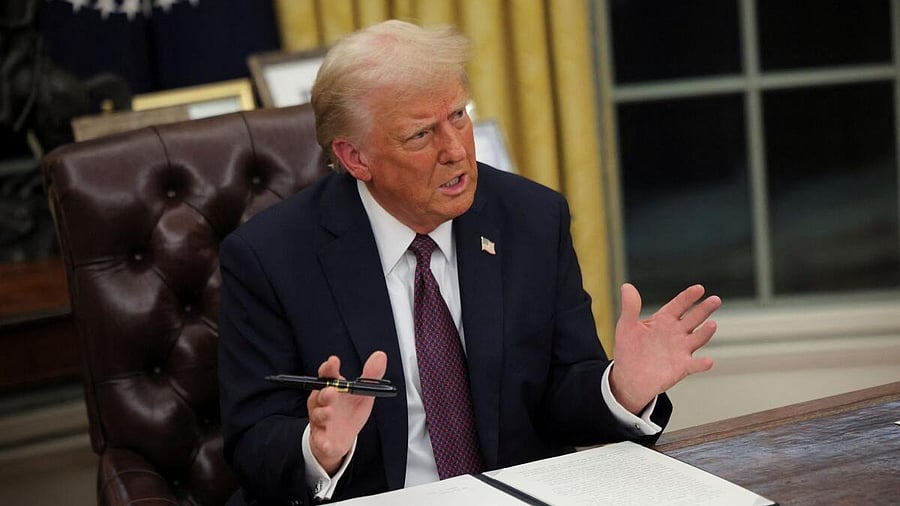
US President Donald Trump.
Credit: Reuters Photo
New Delhi: President Donald Trump’s executive order to restrict birthright citizenship is likely to hit not only the illegal immigrants from around the world but also the students and professionals, who hail from India and other foreign countries and are legally staying in the United States.
One of the many executive orders Trump signed soon after returning to the White House on Monday sought to deny citizenship not only to the babies of illegal or undocumented immigrants but also to the children of people studying or working in the United States legally on temporary student or work visas.
The Trump Administration is likely to face legal challenges to curtail birthright citizenship, which is enshrined in the US Constitution.
But, if his executive order is implemented, a child born in America to Indian parents, even if one of them is on an H-1B visa or an F1 visa, would not be entitled to US citizenship. The US Citizenship and Immigration Services (USCIS) data shows that over a million Indians are waiting for green cards in America. The process to get permanent residency is likely to get complicated and the wait even longer as the children born to Indians studying or working on temporary visas in America would no longer be entitled to US citizenship. US citizens, after turning 21, can take advantage of family-based immigration to petition for their parents to join them in America. But, with birthright citizenship gone, many children born to Indian immigrants on temporary work or student visas in America would no longer be able to sponsor their parents and help them continue to stay in the US.
The children of Indian parents working or studying in America on temporary non-immigrant visas will no longer be able to continue studies in the US after turning 21 as they will no longer be entitled to dependent status. They will have to obtain US student visas to continue their studies in America or relocate to India.
Trump sought to reinterpret the American Constitution’s 14th Amendment, which guaranteed the citizenship of all children born in the United States – except for the children of foreign diplomats – regardless of race, colour, or ancestry. The 14th Amendment, which was ratified in 1868, states that “all persons born or naturalized in the United States, and subject to the jurisdiction thereof, are citizens of the United States and of the state wherein they reside”.
He, however, argued that the 14th Amendment of the Constitution had never been interpreted to extend citizenship universally to everyone born within the US. The 14th Amendment had always excluded from birthright citizenship persons who were born in the US but not “subject to the jurisdiction thereof”, noted the 78-year-old Republican, who succeeded Joe Biden as the American President on Monday.
He ordered government agencies to stop issuing citizenship to a child, born in the US after February 20 next, if her or his mother was unlawfully present in the US and her or his father was not a US citizen or lawful permanent resident at the time of her or his birth, or if the child’s mother’s presence in the US was lawful but temporary, and the father was not a US citizen or lawful permanent resident at the time of her or his birth.
The US was home to about 4.8 million Indian Americans as of 2022, according to an analysis by the Pew Research Centre of the US Census Bureau. Indian Americans account for 20 per cent of the nation’s Asian American population overall. While 66 per cent of Indian Americans are immigrants, 34 per cent were born in the US.
Around half of Indian Americans live in just four states – California (20 per cent), Texas (12 per cent), New Jersey (9 per cent) and New York (7 per cent).
Trump, who campaigned for his re-election on a strong anti-immigrant narrative, often in the past condemned the principle of birthright citizenship as ‘ridiculous’. He also vowed to target ‘birth tourism’ or the practice of foreign citizens travelling to the US to give birth to ensure US citizenship for their children.
“Denying citizenship to US-born children is not only unconstitutional — it’s also a reckless and ruthless repudiation of American values. Birthright citizenship is part of what makes the United States the strong and dynamic nation that it is,” Anthony D. Romero, executive director of the American Civil Liberties Union, said. “This order seeks to repeat one of the gravest errors in American history, by creating a permanent subclass of people born in the US, who are denied full rights as Americans.”
The ACLU already sued the Trump Administration over its executive order seeking to strip certain babies born in America of their US citizenship.
“We will not let this attack on newborns and future generations of Americans go unchallenged. The Trump administration's overreach is so egregious that we are confident we will ultimately prevail,” said Romero.
